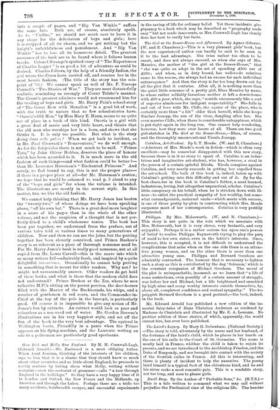The Girl at the Dower - House and Afterward. By Agnes Giberne.
(W. and R. Chambers.)—This is a very pleasant girls' book, but the now experienced author can hardly be said to be seen in it to the best advantage. She tries rather too often to be smart, and does not always succeed, as when she says of Mrs. Maurice, the mother of " the girl at the Dower-House," that " she was quite an adept in the art of spending £500 out of £250 ; and when, as in duty bound, her well-to-do relatives came to the rescue, she always had an excuse for each individual extravagance." And then the story is far too long drawn out for all the plot that it contains. After all, it is nothing more than the quiet little romance of a pretty girl, Rhea Maurice by name, to whose rather selfishly luxurious mother is left a dower-house with £90 a year, which, she says, " sounds uncommonly like a sort of superior almshouse for indigent respectability." She falls in and out of love with Mr. Cliffe, the squire of the place, who is certainly more than " a bit" older than herself, while she keeps Sinclair Jessopp, the son of the vicar, dangling after her. She even marries Cliffe, when there is considerable unhappiness, which is put right again in the long run. One cannot help wondering, however, how they were ever lovers at all. There are two good girl-sketches in The Girl at the Dower-House,—Rhea, of course, and the thoroughly unconventional Ursula Jessopp.






















































 Previous page
Previous page